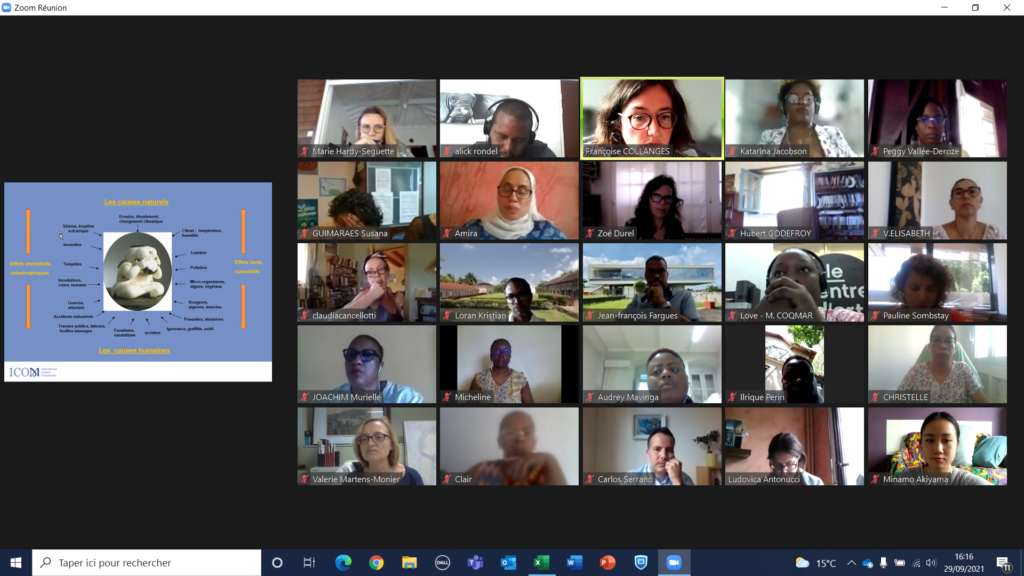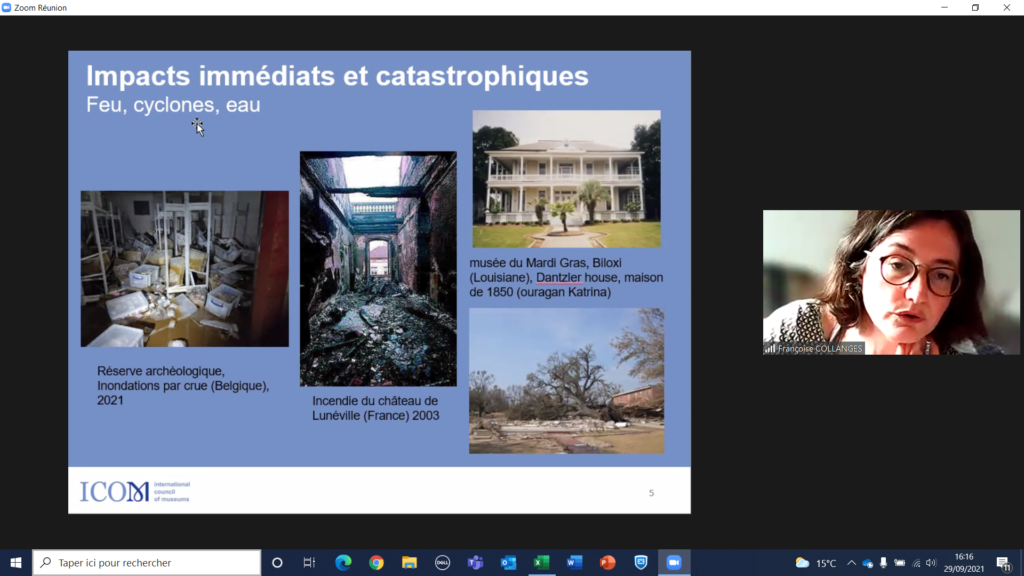by Alexandra Gooding


No cultural heritage organisation or site is fully safe from disaster, no matter where in the world they are located. In the context of cultural heritage preservation, “disaster” can take many forms: natural disasters like hurricanes, earthquakes, and volcanic activity; biological agents like mould or pests; service interruptions to building management systems; an object being stolen; or even violent societal unrest. While it is impossible to mitigate all threats all the time, there is a lot that can be done to prepare for your specific organisation’s most likely “worst-case scenarios,” which can help to mitigate the effects should those scenarios ever become a reality.
“In late 2019, MAC and the International Council of Museums (ICOM) – in partnership with the Smithsonian National Museum of African American History and Culture’s Office of Strategic Partnerships, the French Ministry of Culture, and Collectivité Territoriale de Martinique – launched applications for a disaster management workshop to be held in Martinique in late spring 2020,” says MAC’s Immediate past-president, Natalie Urquhart. Urquhart explained that this program “is part of MAC’s ongoing commitment to developing shared resources and training opportunities for members,” and that the objective of the programme is “to strengthen the capacities of museum professionals to identify and mitigate risks, to respond effectively to emergencies and crises, and to build supporting networks across the Caribbean.”
This is not the first time that ICOM has assisted in facilitating this type of regional workshop. “Capacity building has been one of ICOM’s lines of action for many years,” says Carlos Serrano, capacity building programmes coordinator in ICOM’s Secretariat. According to Serrano, the implementation of regional workshops has been particularly strengthened since 2018 when a new position was created within the Secretariat dedicated to these types of programs. “Since then,” he said, “regional programs have been developed and facilitated in Colombia, Morocco, South Africa, and now in the Caribbean. These workshops aim at giving museum professionals from all over the world the chance to participate in high-level training programs led by international experts, and also aim to create regional networks for museum professionals that they can use to exchange information or to initiate and develop collaborative projects.” Serrano emphasised that such programs are not possible without the collaboration of local or regional partners. “MAC participated in the selection of the topic and the conception of the whole program. It is not about ICOM bringing expertise to the region, but rather about finding the local and regional expertise and strengthening it through the sharing of experiences and knowledge, and the creation of networks of professionals.”
Due to the pandemic, the program had to be postponed and converted into a hybrid model. Despite the postponement, a total of 20 trainees from Martinique, Haiti, Guadeloupe, the Dominican Republic, and French Guiana ultimately participated in the program. “In order to ensure the diversity of institutions present at the workshop, a limit of two persons per institution was imposed,” said Urquhart. “This allowed a wide scope of museums in the region to benefit from this critical training opportunity and ensure a strong support network to develop, via the meetings.”
The first three sessions took place virtually from September 29 to October 1; October 19 to 20; and on November 9. An initial pre-training orientation session was also held on September 27. These virtual components comprised presentations and discussions surrounding various themes—such as risk analysis, cultural property safeguard plans, identifying and organising a temporary rescue site—as well as case studies and practical group exercises. The final session is now just weeks away and is scheduled to take place on-site in Martinique (as originally planned) and will be hosted by the Collectivité Territoriale de Martinique (CTM), which has a historical working relationship with MAC.
“The CTM has been involved with MAC for many years,” said Laurent Ursulet, head of the Domaine de Fonds Saint-Jacques at CTM, “just as its own museums have been integrated into the ICOM network for a very long time. The CTM’s partnership supports our continued efforts to develop cooperation within the Caribbean and internationally in an operational and strategic manner. We bring a Creolophone and Francophone experience, along with the infrastructural strengths of the French administration. Within the framework of respectful cultural cooperation, the CTM wants to play an active, not a passive, role.”
A total of 11 trainees from Martinique, Guadeloupe, Haiti, and French Guiana are expected to attend the final, in-person portion of the workshop at the CTM. These three days will include presentations that cover crisis communication, partners in the field, and post-disaster recovery and resilience. There will also be a hands-on exercise about cultural property evacuation and rescue, to be held at the l’Habitation Fond Rousseau, and field trips are being arranged for attendees to visit additional local cultural organisations, such as the Musée d’Histoire et d’Ethnographie, l’ Habitation Clément, Le Mémorial de la catastrophe de 1902/Musée Frank A. Perret, and the Centre de Découverte de la Science et de la Terre.
The full group of 19 participants included 9 trainees from Martinique (7 from museums of the CTM; 2 from Fondation Clément), 5 trainees from Guadeloupe (2 each from Musée Edgar Clerc and l’Écomusée of Marie-Galante; 1 from Mémorial ACTe), 4 trainees from Haiti (1 from Museum of the Haitian National Pantheon; 1 from Le Centre d’Art; 1 from Musée Ogier-Fombrun; 1 from Sant Kiltitel Felix’s Moriso Lewa), and 1 trainee from French Guiana (from the museums of the Collectivité Territoriale de Guyane).
Readers can look forward to coverage of the in-person session in the MAC’s next newsletter!